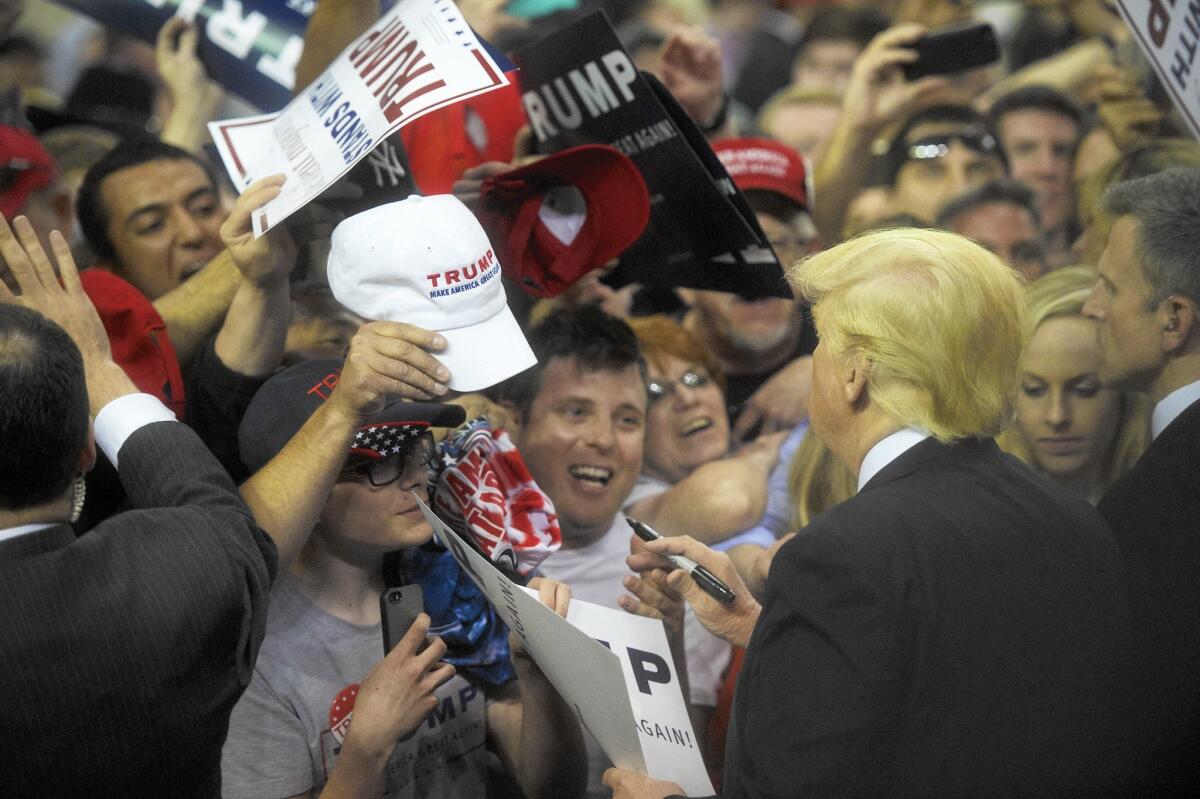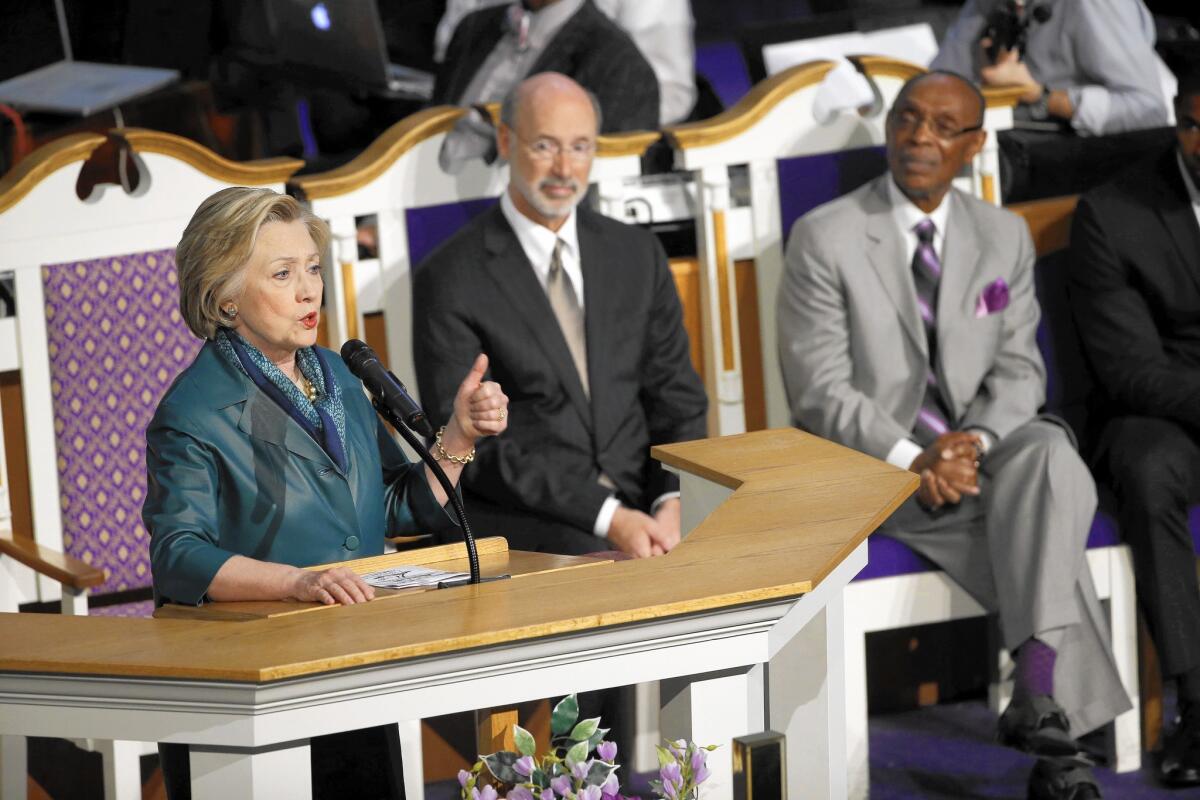Trump and Clinton joust in Pennsylvania as underdogs nip at their heels

- Share via
Reporting from Philadelphia — As Tuesday’s quintuple primaries near, the Republican and Democratic presidential campaigns appear to be moving in tandem for the first time.
Front-runners Donald Trump and Hillary Clinton are targeting each other with an eye to November’s general election and are mostly ignoring their party challengers. Behind them, their rivals are still aiming at the front-runners in a desperate effort to gain ground before the primary season spirals further out of their control.
Polls suggest that voters in Pennsylvania, the biggest of the Tuesday primaries, are lining up behind Clinton and Trump much as voters in New York did last week — in big numbers.
Democrat Bernie Sanders and Republicans Ted Cruz and John Kasich have given no sign they intend to leave the race before the final primaries in June. But losses in Pennsylvania and the four other Tuesday primaries would be another major blow to the underdog candidates, both in momentum lost and in the delegates each needs to rebound.
“They are struggling to get a narrative that trumps the notion that the other two are inevitable,” said longtime Pennsylvania pollster G. Terry Madonna, whose surveys for Franklin and Marshall College have Clinton and Trump holding double-digit leads in Pennsylvania.
The contest here has been an echo of the national race. Clinton, who has ties to the state dating to childhood, has campaigned as if she was running for mayor with an excruciatingly local pitch. Sanders, with his more nationalized message, has reveled in the giant, college-area rallies that have dominated his campaign everywhere.

Among the Republicans, Trump is pitching himself in a campaign ad meant to reassure voters he’s presidential material. His competitors are casting this state — as they did the last one — as the place to waylay the nomination of a businessman-entertainer who they say would sully GOP chances in the fall from the presidential level on down.
“Pennsylvania has a platform to speak to the country,” Cruz said Friday in Scranton. “What path do we want the party to go down?”
After an intense focus on New York before its primary last Tuesday, the race has fractured geographically as candidates careened through Pennsylvania, Maryland, Delaware, Connecticut and Rhode Island. But the themes have remained constant in all five states.
For the front-runners, moving toward the general election carries some risk, so neither Clinton nor Trump has completely abandoned comparisons with their challengers. Yet Clinton’s more assertive criticisms of Sanders turned in recent days into a bland mention of his past vote to give immunity to gun makers and sellers from lawsuits stemming from the misuse of their guns. That issue has salience given a crime wave in Philadelphia, home to a large proportion of the state’s Democratic voters.
See more of our top stories on Facebook >>
“Last weekend in Philadelphia, you had 12 shootings,” she reminded female voters Friday in Jenkintown, about 10 miles north. “A police officer was shot, a 4-year-old girl killed.”
Clinton’s advertising has emphasized a November message of job creation, a tax credit for manufacturing and the importance of the “industries of the future.” In appearances she has accented her ties to Pennsylvania, where her father was born and where she spent childhood vacations with her grandparents. She also won the 2008 presidential primary here, defeating Barack Obama by more than 9 percentage points.
In Dunmore on Friday night, she told supporters that she had dined in nearby Scranton and met people who knew her cousins and uncles.
“I had one man say, ‘Didn’t we sled down Court Street one winter?’” Clinton recounted. “Could’ve been. I was there.”
If her criticism of Sanders has grown more muted, her critique of Trump has become more pointed.
“He actually says wages are too high in America,” she said in Dunmore. “I mean, honestly, I don’t know who he talks to. He ought to get out of those towers and actually come down and talk with people.”
Like Clinton, Trump has presented himself as a familiar figure and one who can best improve the region’s economy.
“Who knows Pennsylvania better than Donald Trump? I went to school here and it’s a great state,” the graduate of the University of Pennsylvania’s Wharton business school told supporters in Harrisburg.
In his advertising, Trump promises to create jobs, cut middle-class taxes, strengthen Social Security, expand the military, stop illegal immigration and “knock out” Islamic State — the playbook of every Republican candidate.
“Washington is broken. The truth is too many politicians are totally controlled by special interests and lobbyists,” he says in one ad. “That’s going to change quickly.”
But that calmly recited message is cast aside at his campaign rallies in favor of dubbing Clinton “Crooked Hillary.”
“Is there anyone more crooked than this woman?” he asked in Harrisburg. Citing an earlier tiff between Sanders and Clinton, he said she was “not qualified” to be president.
“You look at her judgment ... then you have all the mistakes that Hillary made as secretary of State,” he said. “A total disaster. Not even talking about Benghazi. Just big horrible mistakes.”
Cruz has nearly begged voters to deny Trump the delegates needed to clinch the GOP nomination. In Scranton on Friday, the senator from Texas contended that “all across this country” Republicans were uniting behind him for a convention fight.
“Republicans recognize that Donald Trump is not the best candidate to go head-to-head with Hillary Clinton, that if Donald Trump is our nominee, Hillary wins and she wins by double digits,” said Cruz, who is a distant second behind Trump in delegates.
He predicted that a Trump nomination would result in a “Walter Mondale-level bloodbath” for Republicans, a nod to the 1984 blowout in which the Democratic nominee won only his home state of Minnesota and the District of Columbia.
Cruz and Kasich, the Ohio governor and the third GOP candidate, argue they would be far stronger than Trump in the fall election. But neither has made a dent in Trump’s lead in Pennsylvania.
Kasich has suffered from a lack of visibility that has made it difficult for him to claim kinship based on his upbringing in McKees Rocks, Pa. A Monmouth University poll of likely Republican voters found that more than 4 in 10 didn’t know Kasich was born in the state, and only 3% said his birthplace made them more prone to support him.
Sanders’ recent rallies have telegraphed — perhaps unintentionally — uncertainty about his plans. Democratic leaders have begun pressuring Sanders to ease criticism of Clinton, arguing he could weaken her in the general election.
In his first event after his humbling New York loss, the senator from Vermont didn’t deliver his usual criticisms of her speeches to Wall Street firms and her campaign fundraising. But at his next stop, he was back to the usual critiques, and he is critical again in an ad.
“The truth is you can’t fight a corrupt system by taking its money,” Sanders says in the ad.
So far, that message hasn’t cut into Clinton’s strength any more than the Republican challengers’ criticisms of Trump have turned voters against him. The challengers all have been in the uncomfortable position of citing national polls about the front-runners’ weaknesses but not the state surveys that show them ahead.
Unless there are upsets Tuesday, the races may diverge again. Clinton and Sanders are popular among Democrats, and that could heighten pressure on them not to reignite a fractious fight.
Yet among Republicans, even Trump victories Tuesday would not erase continuing distaste for him within his party.
In Pennsylvania, 3 in 10 Republican voters in the Franklin and Marshall poll said they held strongly unfavorable views of him. The Republican race thus seems destined to be vitriolic as long as there are primaries left to contest.
Twitter: @cathleendecker
ALSO
How California’s U.S. Senate ballot could cause problems for the June 7 primary
Cruz and Kasich team up to stop Trump, saying they’ll each sit out future primaries
New poll of millennial voters shows clear shift toward Democrats, away from Trump
More to Read
Get the L.A. Times Politics newsletter
Deeply reported insights into legislation, politics and policy from Sacramento, Washington and beyond. In your inbox twice per week.
You may occasionally receive promotional content from the Los Angeles Times.











